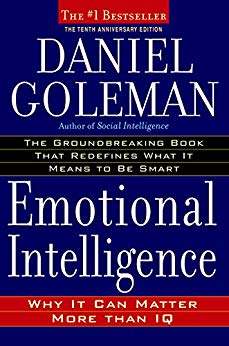

This article is an excerpt from the Shortform summary of "Emotional Intelligence" by Daniel Goleman. Shortform has the world's best summaries of books you should be reading.
Like this article? Sign up for a free trial here .
We all have arguments with our spouses and partners, husbands and wives, boyfriends and girlfriends. Fights are a natural part of relationships. But how do you have a healthy argument, and not a toxic one? Learn the secrets to having great arguments with your partner.
General Ideas on Healthy Conflict in Relationships
Broadly speaking, men and women need different advice to help improve their marriages.
For men:
- Try not to avoid conflict. When issues are left unacknowledged, the emotions around them intensify, the pressure builds, and the situation could explode.
- Remind yourself that if your wife brings up a complaint or disagreement, it might be her way of trying to improve the relationship–it might be an act of love. Anger or discontent with one of your actions is not necessarily a personal attack, it just means your wife has strong feelings about the issue.
- And if you do enter into a disagreement, be wary of offering up a solution too soon. Women, in general, are looking for their feelings to be heard and understood first–if you jump into a solution too soon, it suggests that her feelings don’t matter and aren’t important.
For women:
- Avoid criticizing your husband’s character. You can raise issues with an action they took or something they did, but don’t turn it into a black or white statement on their personhood. Identify the action and why it’s emotionally distressing to you, and it helps to put any complaints into a larger context of love for your husband and desire to improve the relationship.
How to Have Good Arguments
Goleman offers some great general advice for couples looking to improve their relationship in the way they handle disagreements:
Stick to one topic. Sometimes, arguments about one thing turn into screaming matches about all the wrongs anyone has ever committed. Keep the discussion focused–this will help avoid personal attacks and resolve concrete issues.
Use the XYZ formula. X is the action, Y is how it made you feel, Z is what you’d prefer they did next time. “When you forgot to put gas in my car, it made me feel like you didn’t care about me. Next time you could do it first thing when you take my car, or at least let me know before I get home that you forgot.”
Give each person a chance to explain their perspective at the forefront. This will help resolve any fundamental misunderstandings right away before the argument has a chance to take hold. At the very least, it will give each person a chance to understand the other person’s point of view, which will make it more productive to continue discussing the issue.
Show your partner you’re listening. Most people in the throes of any emotional distress just want to be heard and understood. Empathy is an excellent reducer of tension. You can repeat the other person’s feelings back to them in your own words to confirm you understand them correctly. If you’ve misunderstood their feelings, you can try again until you get it right.
Learn how to soothe yourself first. If you can learn how to handle your own emotional hijackings and recover from them quickly, you’ll be able to listen to and handle your partner’s emotional hijackings with more ease. Remember, the stronger our own emotions, the less we can hear, understand, or care about someone else’s. It’s crucial to be able to calm yourself down first.
Challenge toxic thoughts. When we’re upset, it’s easy to get swept away by those black and white absolutes that keep us angry–”he doesn’t care about anyone else but himself, he’s always so selfish”. If you find yourself thinking these thoughts, try challenging them directly–for example, intentionally remind yourself of all the thoughtful things he’s done for you. This can help balance your emotional response and bring your focus back to the action that’s upset you, instead of being upset at the person.
Try not to get defensive. When we feel attacked, we go on the defensive. In arguments, this often looks like making excuses, refusing to take responsibility, or attacking with our own criticisms. If you find yourself getting defensive, remind yourself that what feels like an attack to you is really just your partner having strong feelings about this issue–they want you to pay attention to it, though they may not be asking for that in the healthiest way.
Validate your partner. Articulate to your partner that you can see things from their point of view and that their perspective is valid–even if you don’t agree with it yourself. You can even simply acknowledge their emotions if you don’t necessarily agree with their argument: “I see I hurt your feelings.”
Take responsibility or apologize if you’re in the wrong. If you have the self-awareness to admit that you did do something wrong, admit it to your partner. A simple and honest apology can go a long way to smoothing over the worst disputes.
Agree on a time-out. If nothing else, both partners should be able to call a time-out and cool off if they need to, but this needs to be discussed when emotions aren’t high so it can be used in times of need. Agree on a phrase or method of calling the time-out that both partners will recognize, and then actually use the cooling off time to cool off. Refer back to the previous chapter to find tips for cooling off.
———End of Preview———

Like what you just read? Read the rest of the world's best summary of Daniel Coleman's "Emotional Intelligence: Why It Can Matter More than IQ" at Shortform . Learn the book's critical concepts in 20 minutes or less .
Here's what you'll find in our full Emotional Intelligence summary :
- What are emotions? Why do we have them?
- What is emotional intelligence? Why is it important?
- How do you manage your own emotions? Anger, anxiety, and sadness?
- How can you approach your relationships with more emotional intelligence?
- How can you teach your children emotional intelligence?
- How can emotional intelligence boost your career?






